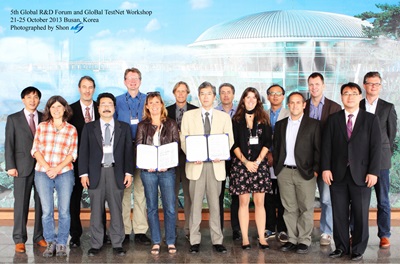 A Memorandum of Understanding (MoU) establishing the ‘GloBal TestNet’ was signed on 21 October 2013 by representatives of 16 Ballast Water Treatment System (BWTS) testing organisations in Busan, Republic of Korea. The test facilities of DHI Singapore and DHI Denmark were both signatories to the MoU and - Martin Andersen (Business Development Manager, DHI Singapore) has been elected Vice-chairman for the organisation, representing all Asian test facilities.
A Memorandum of Understanding (MoU) establishing the ‘GloBal TestNet’ was signed on 21 October 2013 by representatives of 16 Ballast Water Treatment System (BWTS) testing organisations in Busan, Republic of Korea. The test facilities of DHI Singapore and DHI Denmark were both signatories to the MoU and - Martin Andersen (Business Development Manager, DHI Singapore) has been elected Vice-chairman for the organisation, representing all Asian test facilities.
GloBal TestNet is a new formal group of organisations involved in testing for BWTS certifications. The MoU establishing Global TestNet was signed during a pre-conference event held as part of the fifth Global Ballast Water Management R&D Forum and Exhibition. It was held in Busan on 23-25 October 2013.
The signing marks an important milestone in the global effort to address the problem of invasive species transferred through ships’ ballast water. It hopes to:
- address concerns within the shipping industry about a perceived lack of standardisation and harmonisation among ballast water treatment technology test organisations
- achieve greater levels of transparency and openness in the process of technology approvals
- raise the standards of quality control and quality assurance in what can be a complex testing process
The move is expected to benefit test facility clients as well as the end-users of ballast water treatment technologies. The latter refers to the ship owners who need cost-effective and environmentally-friendly systems to meet the requirements of the International Convention for the Control and Management of Ships' Ballast Water and Sediments (BWM Convention), 2004.
“The signing of this MoU is sending a very strong signal that test facilities worldwide are seriously considering the concerns expressed by shipping industry, relating to the transparency and harmonisation of testing activities and methods applied,” Martin says. “We are a leading test organisation with facilities in Europe as well as Asia – covering cold, temperate and tropical waters in all ranges of salinities. As such, we are very happy to take a leading role in materialising this MoU into actual harmonisation and knowledge sharing activities.”